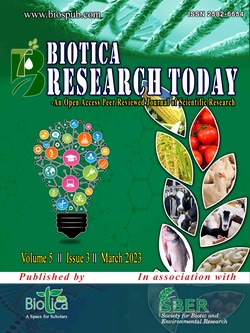
Biochar: A Sustainable Solution for Reducing Greenhouse Gas Emissions
Fida Banu M.R.
Dept. of Soil Science, College of Agriculture, Vellayani, Kerala Agriculture University, Kerala (695 522), India
DOI: NIL
Keywords: Biochar, Carbon sequestration, Greenhouse gas emission, Production
Abstract
Biochar is a promising tool for climate-smart agriculture. It is a type of charcoal that is made from burning organic wastes in the absence of oxygen, which can help store carbon in the soil for thousands of years. When added to soil, biochar helps to improve soil quality, retain water, and sequester carbon, which can help to mitigate climate change. Biochar is also a renewable resource that can be made from agricultural waste products, which makes it a cost-effective and sustainable solution for farmers. By using biochar, farmers can increase their crop yields and reduce their greenhouse gas emissions, making agriculture more sustainable and climate-friendly. This article explores the benefits of using biochar in agriculture and its potential to promote climate-smart farming practices.
Downloads
not found
Reference
Jabin, P.P.N., Rani, B., 2020. Biochar effects on CO2 emission and nitrogen mineralization in sandy and laterite soils. International Journal of Chemical Studies 8, 2913-2916.
Pratiwi, E.P.A., Shinogi, Y., 2016. Rice husk biochar application to paddy soil and its effects on soil physical properties, plant growth, and methane emission. Paddy Water and Environment 14, 521-532.
Singh, B.P., Hatton, B.J., Singh, B., Cowie, A.L., Kathuria, A., 2010. Influence of biochars on nitrous oxide emission and nitrogen leaching from two contrasting soils. Journal of Environmental Quality 39, 1224-1235.
